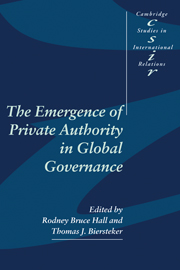Book contents
- Frontmatter
- Contents
- List of figures
- List of tables
- List of contributors
- Preface and acknowledgements
- Part I Introduction: theorizing private authority
- Part II Market authority: globalization and “globaloney”
- Part III Moral authority: global civil society and transnational religious movements
- Part IV Illicit authority: mafias and mercenaries
- 8 Transnational organized crime and the state
- 9 The return of the dogs of war? The privatization of security in Africa
- Part V Conclusions and directions
- Bibliography
- Index
- CAMBRIDGE STUDIES IN INTERNATIONAL RELATIONS
9 - The return of the dogs of war? The privatization of security in Africa
Published online by Cambridge University Press: 22 September 2009
- Frontmatter
- Contents
- List of figures
- List of tables
- List of contributors
- Preface and acknowledgements
- Part I Introduction: theorizing private authority
- Part II Market authority: globalization and “globaloney”
- Part III Moral authority: global civil society and transnational religious movements
- Part IV Illicit authority: mafias and mercenaries
- 8 Transnational organized crime and the state
- 9 The return of the dogs of war? The privatization of security in Africa
- Part V Conclusions and directions
- Bibliography
- Index
- CAMBRIDGE STUDIES IN INTERNATIONAL RELATIONS
Summary
In the current era, neoliberalism has emerged as the defining economic program by which state administrations are held accountable. This has gone hand in hand with the globalization process, building a “market civilization” whereby states are more and more subject to the apparent arbitrary whim of “the market.” At the same time, technological advances have facilitated a compression of time and space within the global political economy. The autonomy of the state has, in a varied but dialectical action, been reduced and the ability of administrations in the South to resist prescriptions emanating from the developed world (but increasingly transnational in character) has been diminished. “Faced with the power of globalized production and international finance, including debt structures, leaders are constrained to concentrate on enhancing national conditions for competing forms of capitalism,” the dominant being neoliberalism. This process is partial and incomplete, but is particularly strong and most energetic in the periphery of the global economy, where the hegemonic agenda has strenuously pushed for states to abandon any (remaining) dirigiste pretensions they may possess and instead “open up” their economies to international capital flows. At the same time, the national budget has been framed by advocates of the neoliberal solution as a source of many of the state's woes, and tight fiscal constraints are placed on its activities, with obvious social implications.
- Type
- Chapter
- Information
- The Emergence of Private Authority in Global Governance , pp. 183 - 200Publisher: Cambridge University PressPrint publication year: 2002
- 10
- Cited by

